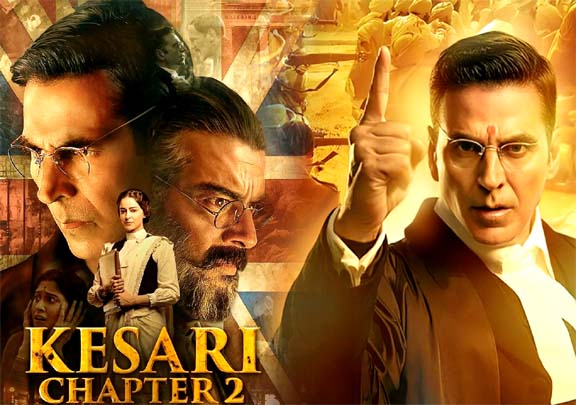DE Entertainment Desk
No Indian can ever forget the tragedy that shook the nation on April 13, 1919. A date etched in blood and memory in every Indian’s mind and heart.
Exactly 106 years ago today, thousands of unarmed civilians gathered peacefully at Jallianwala Bagh, only to be gunned down without warning.
106 years later, director Karan Singh Tyagi makes his theatrical debut with Kesari Chapter 2 — a powerful retelling of the genocide and the courageous legal battle that followed, led by C.
Sankaran Nair, the man who dared to confront the British Empire and question them about their cruelty.
The movie highlights how Sankaran Nair, a high-ranking Indian member of the Viceroy’s council who was once knighted by the Empire, stood up and advocated for the truth following the horrific massacre in 1919.
The narrative emphasizes how Nair demonstrated that the massacre was not a response to a riot, but a deliberate act — what we now refer to as genocide.
Director Karan Singh Tyagi believes the narrative holds greater significance now than ever before. He states, “The occasion reflects the current era we are in.
” We live in a post-truth era characterized by the widespread presence of fake news. Tyagi says, “I was intrigued that after people learned about the Jallianwala Bagh tragedy, the truth was concealed the following day.”
He further emphasizes how the British sought to suppress any voice opposing the massacre.
“Certain regional newspapers aimed to reveal the truth, but they were set ablaze.” There is a well-known poem by a survivor titled Khooni Baisakhi — the British Empire made significant efforts to prohibit that poem.
The Empire began disseminating a false narrative in which the victims were designated as terrorists. “I believe it’s an intriguing tale to share with people in 2025.”
Tyagi’s strategy in the film is dual — to investigate what the British intended and executed before and after April 13, 1919, and to assess the profound human toll of it all.
This is the tale of Sankaran Nair, who received a knighthood from the British Empire. His subsequent confrontation with the British in an incredibly dramatic fashion is a story of bravery.
Upon resigning from the council, he informed the Viceroy [similar to today’s PM], “Your empire is managed by yes-men; hence, why not appoint the jamadar in my place?”
Tyagi, a law and politics student, was captivated by the narrative for its profound political and emotional dimensions.
The movie draws inspiration from the book The Case That Shook the Empire, authored by Raghu Palat and Pushpa Palat, who are Nair’s great-grandson and his spouse.
Tyagi also conducted extensive historical research, studying works by writers such as Kim Wagner, V.N. Datta, and Kishwar Desai, along with testimonials from survivors and government inquiries.
A daring claim made by the film is that the massacre was not unplanned—it was intentional. “A plane flew over the Bagh to see if a sufficient number of people had gathered.
” Troops were summoned—Gurkha forces and Baluch soldiers—while the Sikh infantry remained entirely unaware, as they would have reacted violently if informed.
“My Grandfather saw Jalianwala Bagh Massacre”- Akshay Kumar reveals why he did Kesari Chapter 2 –
Tyagi remembers feeling profoundly unsettled after viewing a documentary in which General Dyer’s great-granddaughter justified his actions, labeling the assembled crowd as looters. “That interview truly infuriated me.
” She categorized those who arrived at Jallianwala as thieves. The movie is significant since you’ll be astonished to learn that the empire accelerated rapidly following the massacre.
They took drastic measures to praise General Dyer as a hero.
Although it showcases Akshay Kumar in the lead role, Kesari 2 started out as an independent venture.
For Tyagi, the message is unmistakable: “Are you aware that Kesari represents the color of revolution?”
For us, the torch of revolution is being passed to this tale, where a single individual confronts the empire.
Revolution may sound like a significant term, but its core idea is quite straightforward—defending what is just.”
Tyagi also praises Kumar’s performance in the film and says, “He’s been incredible in his support for me.
I just want the audience to watch the film because I feel this is one of his best performances.
He’s heard stories from his grandfather and his father. So he feels a personal connection to the tragedy.”
As the film approaches its release, Tyagi hopes viewers will take away a central message—perfectly expressed in the Pablo Neruda quote featured in the film: “Empires fall because they heed their lawyers and ministers instead of their poets.”
“Empires must pay attention to the everyday citizens of this nation.”

